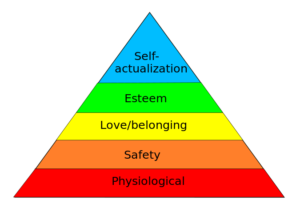
Abraham Maslow’s Hierarchy of Needs is a famous psychological theory based on the observation that people as a rule take care of their most pressing needs first, and only when those are satisfied do they develop an ambition to move to the next level.
The most common way to represent this is as a coloured pyramid – one can see an example as the title image of this essay. The ‘lower’ desires represent the more fundamental ones. The need represented by each level must be satisfied before a person is motivated to move on to the next one.
The lowest level is physiological needs. This basically means air, water and food. When the need for these are met a person moves on to safety needs, such as physical and economic security. Meeting those needs will mean a person advances to the level of love and belonging, where they try and satisfy a need for friendship, intimacy and belonging.
Above these three levels are two that are arguably not so much ‘needs’ as ‘decencies’. The first is the need for self-esteem. This relates to the human desire to be accepted and appreciated by others and by oneself. Generally the lower one’s self-regard the greater one’s need for fame or respect.
The last level is self-actualisation. This involves fulfilling one’s greatest potential; becoming the best version of oneself that it is possible to be.
It’s common for individuals to look at where they are themselves on Maslow’s hierarchy. It certainly is an interesting theory for anyone curious about how they fit into the grand scheme of things.
Some people are further than others. What we generally consider wealthy, fortunate, or “doing good” correlates pretty strongly with where a person is on the hierarchy of needs. If we take a look at humanity, though, we can see that as a whole we have not come very far.
According to the World Food Programme, 842 million people go to bed hungry on any given night. This represents about one in every eight people, all of whom have fallen at the first hurdle when it comes to the hierarchy of needs.
If one thinks about what that means in practice, it is one in every eight people who have no realistic chance of ever making progress in any of the other needs. After all, someone who goes to bed hungry will hardly be concerned with their bank account, because if they had any money they would have bought food with it.
It’s worth thinking that one in every eight people are that desperate – possibly that means one in every eight people are desperate enough to have a strong incentive to do serious harm to another human being, should an opportunity for a robbery arise.
After all, the major incentive a person has for not robbing someone is their desire for physical security, in the form of not going to jail, and their desire for social esteem, in the form of not being thought to be a robber.
As both of those needs are less fundamental than the need for food, a hungry person is unlikely to care about them very much. The desire for food is even more fundamental than the desire for peace, and so one in every eight of us is too hungry to care at all about all the war in the world.
A global universal basic income would raise us up the hierarchy, as it would take care of most basic physiological needs. It is the inability to fulfill the need for these that causes the vast majority of human suffering in the world.
It does, however, raise the spectre of overpopulation, at least in the minds of those who believe that some of the tropical peoples are incapable of keeping their breeding in check. If a person believes this, then it is natural to also believe that a global basic income will lead to ecological collapse.
Maybe humankind is doomed to remain at a reasonably low level because of the belief that if we co-operate too closely, factions within humanity will take advantage of this peace to wage war against other factions, perhaps even without those factions knowing about it.
